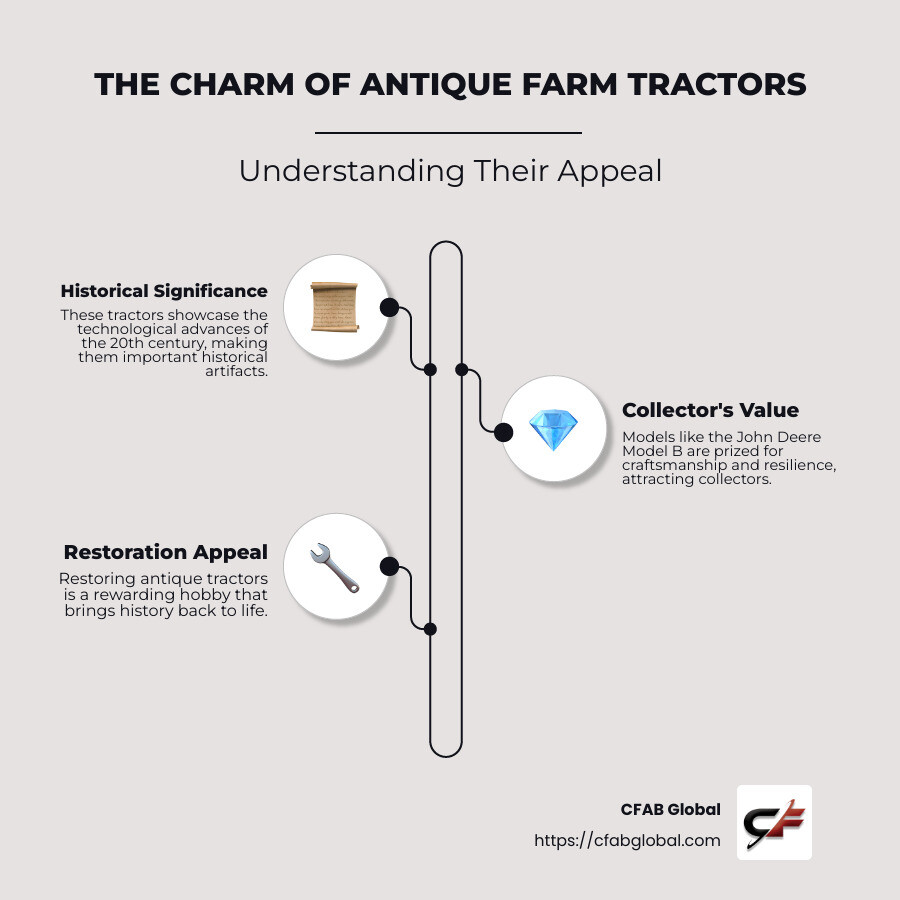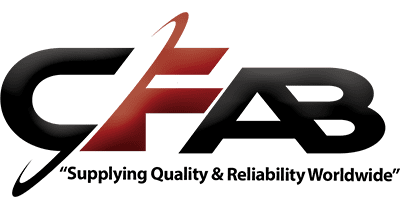Antique farm tractors hold a unique charm that captivates collectors and history enthusiasts alike. These vintage agricultural machines do more than just plow fields; they tell stories of a bygone era, showcasing the evolution of farming technology. If you’re intrigued by these mechanical marvels, here are a few key points to know:
- Historical Significance: Antique farm tractors are not just tools; they’re historical artifacts that reflect the technological advances of the 20th century.
- Collector’s Value: From the iconic John Deere Model B to the robust Ford Model 8N, these tractors are prized by collectors for their craftsmanship and resilience.
- Restoration Appeal: Restoring antique tractors presents a rewarding hobby for enthusiasts, offering the satisfaction of reviving a piece of history.
I’m Todd Cleppe, CEO and Co-Founder of CFAB Global. With over 25 years in engineering and manufacturing, my journey has connected me deeply with industrial machinery. Antique farm tractors, in particular, fascinate me both for their historical importance and their role in advancing agricultural techniques. Understanding their impact allows us now to appreciate innovative solutions that drive today’s farm machinery forward.

Antique farm tractors terms to learn:
The Allure of Antique Farm Tractors
Antique farm tractors are more than just relics of the past; they are vibrant pieces of history that continue to captivate collectors and enthusiasts worldwide. These vintage machines offer a glimpse into the evolution of agricultural technology and serve as a nostalgic reminder of simpler times.
Collector’s Items
For many, antique tractors are treasured collector’s items. Models like the John Deere Model B and the Ford Model 8N are particularly sought after. Their enduring craftsmanship and sturdy design make them appealing to collectors who value both aesthetics and functionality. Collectors often seek out rare models, such as the low-production Wheatland and Standard tread models, which add uniqueness to their collections.
Historical Significance
Antique tractors are valuable for their historical significance. They represent pivotal advancements in farming technology during the 20th century. Each tractor tells a story of innovation and adaptation, reflecting the agricultural practices of its time. For example, the transition from horse-drawn plows to mechanized tractors marked a significant turning point in farming efficiency and productivity.
Restoration Appeal
Restoring antique tractors is a popular hobby among enthusiasts. The process of bringing these machines back to life offers a rewarding challenge, combining mechanical skill with historical research. Enthusiasts often take pride in reviving these tractors, preserving their original charm while ensuring they remain operational. This hobby not only keeps history alive but also fosters a deep appreciation for the engineering prowess of the past.
In summary, antique farm tractors hold a special allure for those who appreciate history, craftsmanship, and the art of restoration. Their significance extends beyond their practical use, offering a tangible connection to the agricultural heritage of bygone eras.
Popular Antique Tractor Models
When it comes to antique farm tractors, certain models stand out due to their historical impact and continued popularity among collectors and farmers. Let’s take a closer look at some iconic models that have left a lasting mark on agriculture.
John Deere Model B
The John Deere Model B is a classic example of a tractor that has stood the test of time. Introduced in 1934, it was designed to be affordable and versatile, making it a favorite among small to mid-sized farms. Its simple design and reliable performance have made it a staple in the collections of tractor enthusiasts.
FARMALL Model H
The FARMALL Model H, produced by International Harvester, was one of the best-selling tractors of its time. Known for its powerful engine and adaptability, it could handle a variety of farm tasks. Its popularity stemmed from its ability to work effectively with multiple attachments, making it a versatile tool for farmers.
Ford Model 8N
The Ford Model 8N, released in 1947, revolutionized farming with its innovative features. It introduced the three-point hitch system, which became a standard in the industry. This model is cherished not only for its historical significance but also for its ease of maintenance and availability of parts, which keeps it running smoothly even today.
John Deere Model 4020
The John Deere Model 4020 is another legendary tractor that has earned its place in history. Introduced in the 1960s, it was known for its power and advanced features, like the Powershift transmission. Its durability and performance have made it a favorite among those who appreciate both functionality and nostalgia.
FARMALL Model M
The FARMALL Model M is a powerhouse from the 1940s that was designed for heavy-duty tasks. Its robust build and reliable engine made it suitable for larger farms. Today, it remains a popular choice for collectors who admire its rugged design and historical importance.
In summary, these antique farm tractor models are celebrated not only for their engineering excellence but also for the stories they tell about agricultural advancements. Whether you’re a collector or a farmer, these tractors offer a unique blend of history and functionality, making them timeless treasures.
Why Farmers Still Use Antique Tractors
In today’s world of high-tech agricultural machinery, antique farm tractors might seem like relics of the past. Yet, many farmers still rely on these vintage machines. Let’s explore why these old workhorses continue to plow fields and harvest crops even today.
Maintenance Costs
One of the major reasons farmers stick with antique tractors is the low maintenance cost. Unlike modern tractors, which often require specialized tools and software for repairs, antique tractors are straightforward to fix. Their simple mechanical designs mean fewer electronic components that can malfunction, reducing the need for costly repairs.
Easy Repairs
Antique tractors are renowned for their ease of repair. Farmers can often fix these machines themselves without needing to call in expensive technicians. The tractors’ mechanical simplicity allows for quick troubleshooting and repair, minimizing downtime during critical farming seasons.
A case in point is Tony Lourey, a farmer from Duluth, Minnesota. When his modern tractor broke down, he faced long delays and high costs to get it repaired. This scenario is not uncommon, as highlighted in a Reuters article discussing the challenges faced by farmers due to the consolidation of tractor dealerships.
Availability of Parts
Another compelling reason for the continued use of antique farm tractors is the availability of parts. Many of these tractors were produced in large numbers, and parts are still relatively easy to find, either through specialized suppliers or salvage yards. This makes it feasible to keep an antique tractor running for decades.
For instance, the Ford Model 8N, with its innovative three-point hitch system, is not only a piece of history but also a practical choice for farmers due to the abundance of replacement parts available. This ensures that even older models can stay operational without significant investment.
In summary, the combination of low maintenance costs, easy repairs, and the availability of parts makes antique farm tractors a practical choice for farmers. These machines offer a blend of nostalgia and functionality, proving that sometimes, the old ways are still the best ways.
The Market for Antique Farm Tractors
The market for antique farm tractors is as vibrant and diverse as the tractors themselves. Collectors, enthusiasts, and even working farmers are all part of this unique ecosystem. Let’s dig into the key aspects of this fascinating market.
Auctions: A Hub for Enthusiasts
Auctions are a primary venue for buying and selling antique farm tractors. These events draw enthusiasts from far and wide, eager to bid on rare and unique models. As reported by Reuters, auctions can be competitive, with prices often rising quickly due to high demand. This is especially true for tractors that have been well-preserved or restored, as they can fetch significant sums.
Auctions not only serve as a marketplace but also as a gathering point for the community. They offer a chance to connect with fellow collectors, share stories, and exchange knowledge about restoration and maintenance.
The Collector’s Market: Passion Meets Investment
For many collectors, antique farm tractors are more than just machines; they are pieces of history. Owning a vintage tractor is akin to owning a slice of agricultural heritage. Models like the John Deere Model B and the FARMALL Model H are particularly sought after due to their historical significance and iconic designs.
Collectors often invest significant time and money into restoring these tractors to their former glory. The restoration process can be both challenging and rewarding, as it involves sourcing original parts and employing traditional repair techniques. Once restored, these tractors can become valuable assets, appreciated not only for their nostalgic appeal but also for their potential return on investment.
Wilke’s Classic Tractors: A Trusted Name
For those looking to purchase antique farm tractors, Wilke’s Classic Tractors in South Central Wisconsin is a renowned name in the industry. With over 35 years of experience, Wilke’s specializes in rare and hard-to-find models, offering a wide range of tractors in various conditions—from original to fully restored.
Located conveniently between Madison and Milwaukee, Wilke’s Classic Tractors is a go-to destination for collectors and farmers alike. Their inventory includes a variety of brands such as John Deere, International, and Allis-Chalmers, among others. Whether you’re a seasoned collector or a farmer looking for a reliable workhorse, Wilke’s provides a trustworthy source for these vintage machines.
In conclusion, the market for antique farm tractors is dynamic and multifaceted. Whether through auctions, the collector’s market, or specialized dealers like Wilke’s Classic Tractors, these vintage machines continue to capture the imagination and admiration of many.

Frequently Asked Questions about Antique Farm Tractors
Are old tractors worth money?
Absolutely! Antique farm tractors can be quite valuable, not just as collector’s items but also as functional machines. Their worth often hinges on factors such as rarity, condition, and historical significance. Tractors like the John Deere Model B and FARMALL Model H are particularly prized for their iconic status and historical importance.
Maintenance costs for these vintage machines can be lower than modern equipment due to their simpler mechanics. This ease of repairability is a major draw for collectors and users alike. Unlike today’s high-tech tractors, older models can often be fixed with basic tools and readily available parts, making them a cost-effective option.
Why are farmers buying 40-year-old tractors?
Farmers are turning to 40-year-old tractors because of their reliability and ease of maintenance. As reported by Reuters, modern tractors can be expensive to repair and maintain due to their complex computer systems. Older tractors, however, offer simplicity and durability.
These historical models are not only easier to repair but also often more affordable. With fewer moving parts and less dependency on electronics, they provide a no-nonsense approach to farming. This makes them ideal for farmers who prefer hands-on maintenance and wish to avoid the high costs associated with newer models.
Where can I find antique farm tractors for sale?
If you’re in the market for antique farm tractors, there are several avenues to explore. Auctions are a popular choice, offering a chance to bid on unique and rare models. These events are not just about buying; they are also social gatherings where enthusiasts share their passion for vintage machinery.
For those seeking a more direct purchase, Wilke’s Classic Tractors in South Central Wisconsin is a renowned dealer. With a vast inventory of 250 to 300 tractors, Wilke’s specializes in rare and hard-to-find models. They offer a range of conditions, from original to fully restored, making it a trusted source for both collectors and farmers.
Whether you’re at an auction or visiting a specialized dealer like Wilke’s, antique farm tractors is full of opportunities to find the perfect machine for your collection or farm.
Conclusion
At CFAB Global, we understand the unique challenges and opportunities that come with owning antique farm tractors. Our commitment to operational efficiency and machinery reliability makes us an ideal partner for those who cherish these vintage machines.
Our Machine Reliability Program is designed to improve the performance and lifespan of your equipment. We offer personalized analysis and support to ensure that your antique tractors remain in top working condition. This program is not just about maintenance; it’s about maximizing the potential of your machinery, reducing downtime, and ensuring long-term reliability.
Antique tractors might be simpler in design, but they require specialized care to maintain their historical value and functionality. That’s where our expertise comes in. Our team at CFAB Global is dedicated to providing custom solutions that meet the specific needs of your vintage equipment. We help you preserve the legacy of these machines while keeping them operational.
Whether you’re a collector or a farmer using these tractors daily, our services are designed to support your goals. By choosing CFAB Global, you’re investing in a partner committed to the longevity and efficiency of your machinery.
For more information on how we can help you with your agricultural equipment needs, visit our agricultural equipment page. Let us assist you in keeping your antique farm tractors running smoothly and efficiently for years to come.






